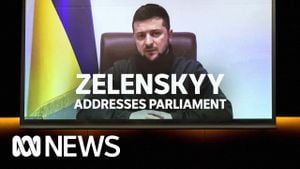On February 24, 2023, the European Union unveiled its latest sanctions targeting Russian cultural figures and business leaders, which includes notable names such as comedian Mikhail Galustyan and chess grandmaster Sergey Karyakin. This expansion marks the 16th package of restrictive measures taken by the EU, focusing on individuals and organizations perceived as threats to Ukraine's sovereignty.
The sanctions list has grown quite lengthy this time, impacting 48 individuals, including media personalities and top executives across various industries. Along with Galustyan and Karyakin, the list features television presenter Yulia Baranova and media manager Kristina Potupchik, among others. Such actions have raised eyebrows, particularly as the EU aims to apply pressure on Russia amid the continuing conflict.
Mikhail Galustyan, known for his humorous performances and contributions to popular culture, expressed his shock at finding himself on the EU's sanctions list. He was quoted stating, “For me, this was a complete surprise,” during his conversation with the Gazeta.ru shortly after the announcement. Galustyan highlighted the absurdity of targeting artists and entertainers, emphasizing their role as purveyors of joy, not disdain.
“European politicians have nothing to counter anymore, especially when they target cultural figures, actors, comedians, and satirists, who bring joy and laughter,” Galustyan continued, underscoring his belief in the importance of cultural figures who defy political trends.
The European Commission justified the inclusion of Galustyan, labelling him as a Russian propagandist and supporter of President Vladimir Putin. The commission stated he utilizes his celebrity status to disseminate Kremlin narratives, adding another layer of complexity to the existing geopolitical tensions. The official documents from the EU indicate this reasoning as part of the comprehensive approach to national security, reflecting their commitment to uphold Ukraine's integrity.
Meanwhile, Karyakin, celebrated for his prowess on the chessboard, also found himself among the individuals sanctioned. This move may be seen as indicative of the EU's strategy to target high-profile Russians as part of broader sanctions affecting the economy and cultural narrative. The EU’s sanctions have begun to encompass entities involved with individuals, signaling a wider scope of impact.
The European Union's expansive list also touches on several organizations tied to the sanctions dates, with 35 entities involved, including major banks and media outlets, demonstrating the EU's rigorous effort to cripple financial pathways currently available to Russia.
On the same day, it was reported the EU has suspended services for 13 Russian banks from the international SWIFT payment system. This ban will create significant ramifications for how financial transactions are conducted within and outside of Russia, heightening the urgency for the region's financial establishments.
Commentary on these measures has varied, with some officials asserting their importance. Kaja Kallas, the head of European diplomacy, noted the sanctions aimed to strengthen Ukraine’s position amid negotiations concerning the crisis. Yet, the efficacy of these measures remains up for debate, with critics pointing out the tendency for such sanctions to backfire and reinforce nationalist sentiments within the targeted entities.
Galustyan's unexpected entry onto the sanctions list raises questions about the intersection of arts, culture, and politics. Should creatives, whose primary goal is to entertain and unite, be subject to political scrutiny? Galustyan emphasized his dedication to bringing happiness to others, pushing back against what he views as arbitrary political restrictions against cultural figures.
Reflecting on his situation, Galustyan stressed resilience, rallying those affected alongside him. He concluded his statements with encouragement, stating, “There are many of us, and you won't be able to close us all. You need to take care of your citizens.”
These recent developments serve as pivotal markers on the timeline of EU-Russia relations, especially considering the escalatory nature of sanctions. What's more, the cultural fallout of these sanctions hits at the core of Russian identity as it grapples with its place on the world stage.
Overall, the European Union's decision to impose sanctions against individuals like Galustyan and Karyakin reiterates the intensified geopolitical climate surrounding the Ukraine conflict. The ripple effects of these actions will likely be felt well beyond immediate financial and social ramifications, altering how culture interplays with national identity and international relations moving forward.



